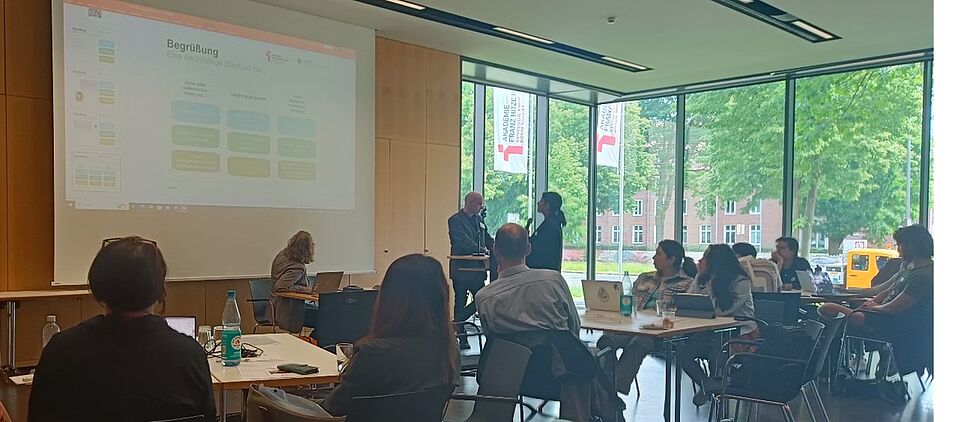Students from Germany and Latin American cities as well as other interested audience were invited. The conference focused on the theme of sustainability in cities and municipalities and began with a reflection by the participants: What does urban sustainability mean to you? What are the key challenges in your home city? Despite the diversity of home cities - from Bucaramanga to Bremerhaven - the initial answers were quite similar: car-centred cities, a lack of or unevenly distributed green spaces and climate change adaptation were perceived as key challenges. Possible answers - improved cycling infrastructure, greening of public spaces, and concepts such as the sponge city - were known to the participants. But how exactly are they being implemented in different cities? What can we learn from these experiences for other contexts? And are these answers profound and far-reaching enough for future-proofing cities?
The conference included presentations from various research and civil society perspectives. Among other things, presenters discussed the concept of the circular bioeconomy in Bolivia as an alternative to extractivist economic models; peri-urban agriculture and agroforestry projects and their effects on the food security of low-income inhabitants; and the urbanisation process of Medellín (Colombia) was critically examined regarding its changing relationships between people and nature.
Julia Wesely was invited to give a presentation on the topic of disaster risk management in Latin American cities. She referred to research in Manizales (Colombia) and Lima (Peru) and showed why integrated disaster risk management necessary to better prepare for disasters such as the current floods in Rio Grande do Sul (Brazil) and to massively reduce their risks and impacts. Furthermore, she outlined that integrated disaster risk management can also be leveraged as an opportunity for local governments, civil society actors, the private sector and other stakeholders to initiate transformations towards more equitable cities. The discussion with participants quickly demonstrated how profoundly discourses on natural hazards and vulnerability, especially in connection with climate change, are already anchored in everyday perceptions. Moreover, the experiences from different cities brought several critical questions to the fore: What role and responsibility does the state have vis-à-vis the private sector? Aren't sustainability and disaster risk management always low priority in contexts where people are unable to meet their basic needs such as water, food and housing? How can large urban planning projects with a lead time of decades and a high environmental impact be designed more flexibly and adapted to current conditions?
The conference ended with a guided walking tour on the implementation of the Sustainable Development Goals (SDGs), where initiatives on fair trade, local and cooperative agriculture and the re-naturing of the River Aa in Münster were presented
Many thanks to all participants and the organisers for this exciting intercultural exchange. For the Urban Studies working group, this event was a great opportunity to re-engage in dialogues with Latin America.
Text and pictures: Julia Wesely, 2024.


